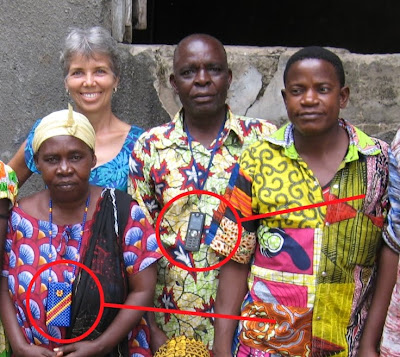 Just a couple of days ago I asked Rose Mayala, my main colleague in adult literacy in Congo, if she had any news of the Twa literacy classes established in the area of Inongo, in the Mai-Ndombe Lake region of northern Bandundu province. “Of course”, she said. “I hear from them every other week by cell phone. Classes are going well.” This is an area where it would be difficult to send or to receive written reports. There’s no formal mail service. Getting there is a major undertaking. But they can talk by phone. Rose and I can talk by phone – me in the US Skype-ing Rose on her cell phone in Kinshasa.
Just a couple of days ago I asked Rose Mayala, my main colleague in adult literacy in Congo, if she had any news of the Twa literacy classes established in the area of Inongo, in the Mai-Ndombe Lake region of northern Bandundu province. “Of course”, she said. “I hear from them every other week by cell phone. Classes are going well.” This is an area where it would be difficult to send or to receive written reports. There’s no formal mail service. Getting there is a major undertaking. But they can talk by phone. Rose and I can talk by phone – me in the US Skype-ing Rose on her cell phone in Kinshasa.One of the fascinating phenomena of Africa is the proliferation of cell phones and how that is changing African life and work. Because of the cost of classic landline phone technology, and its high maintenance demands, telephones were always rare, and often out of service. So rare that now mobile phone companies can almost invent their industry from scratch in Africa. The result is a simpler, cheaper, and more customer-friendly service than you will find anywhere in the United States.
 Even very poor Africans are taking it up with enthusiasm. Everyone wants to give you his phone number, even if it isn’t his but a neighbor’s. Some of my acquaintances call all the time, whether or not they have anything to say, or whether or not they have any phone units.
Even very poor Africans are taking it up with enthusiasm. Everyone wants to give you his phone number, even if it isn’t his but a neighbor’s. Some of my acquaintances call all the time, whether or not they have anything to say, or whether or not they have any phone units. A Congolese can buy a phone for 25$. After signing up with his service and buying an initial phone card, he can keep in touch with his friends even without units of credit, by beeping the friends he wants to contact, and receiving their calls for free. Even with little income, he may feel that he can buy units now and then, when it’s possible to buy cards with as little as one or two dollar’s worth of units.
A phone owner’s major concerns, besides finding and purchasing cards, are keeping his phone’s batteries charged, where electricity is often down, or the whole community is dependent on one or two persons’ solar panels or car batteries, and the vagaries of cell phone coverage in rural areas. It is common to find people standing in the middle of a road, a field, or even up in a tree, with a phone to their ear, trying to find a “sweet spot” where they can communicate, in an area at the edge of coverage.
 While Congo still has wide swaths of territory without cell tower coverage, they are getting fewer all the time, and it has revolutionized our literacy work. We have two major needs in communication:
While Congo still has wide swaths of territory without cell tower coverage, they are getting fewer all the time, and it has revolutionized our literacy work. We have two major needs in communication: First, making the arrangements and making sure local partners have gotten everything taken care of, for a promised literacy teacher training seminar to start work in an area. Afterwards, keeping in touch with the teachers of classes to encourage them, help them deal with any problems that come up, and getting reports.
One of our biggest problems with rural classes, when we don’t have the funds to visit regularly, is to know if something is happening or not, and what is happening. Teachers often don’t write reports, no matter how we plead with them in training. It’s difficult to find a reliable way to send reports even if they’re written, in a country without a viable postal system. Learning if a teacher training has resulted in classes in that area can be pure happenstance. But cell phones are multiplying, and they make all the difference.
Sure is good to know about those classes -- and only about 5 cents per minute.

No comments:
Post a Comment